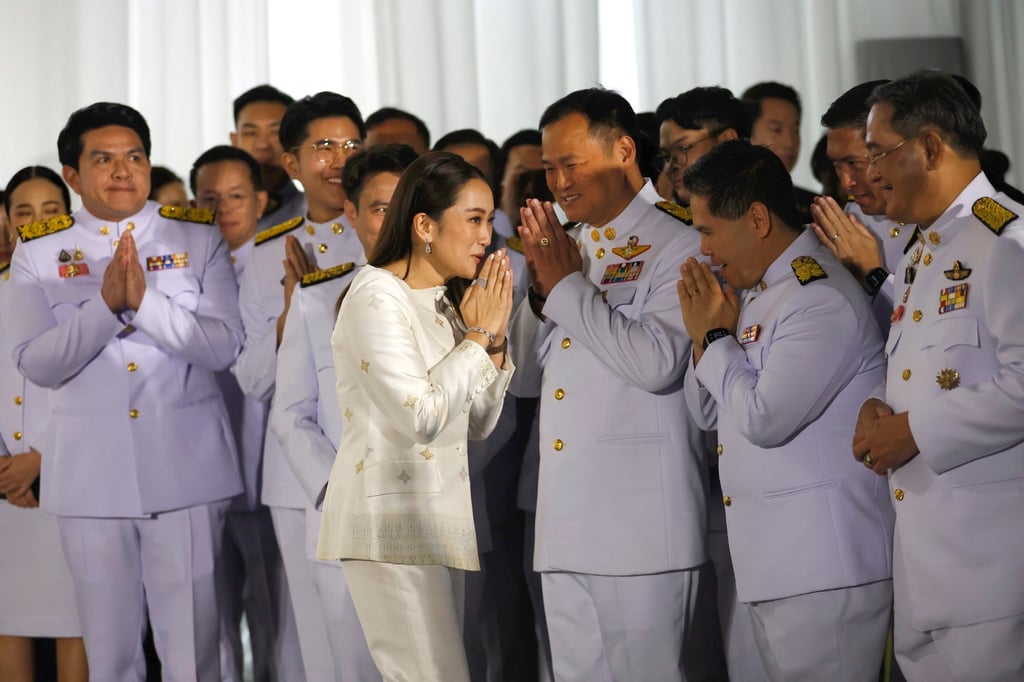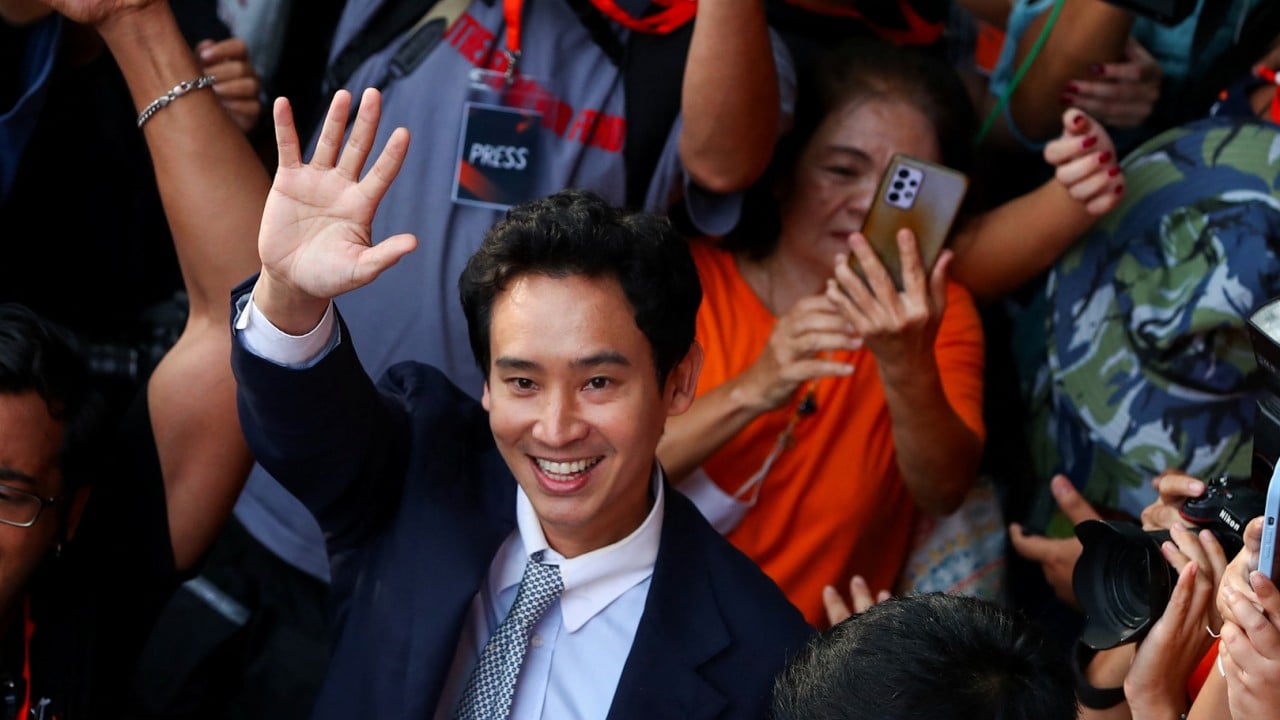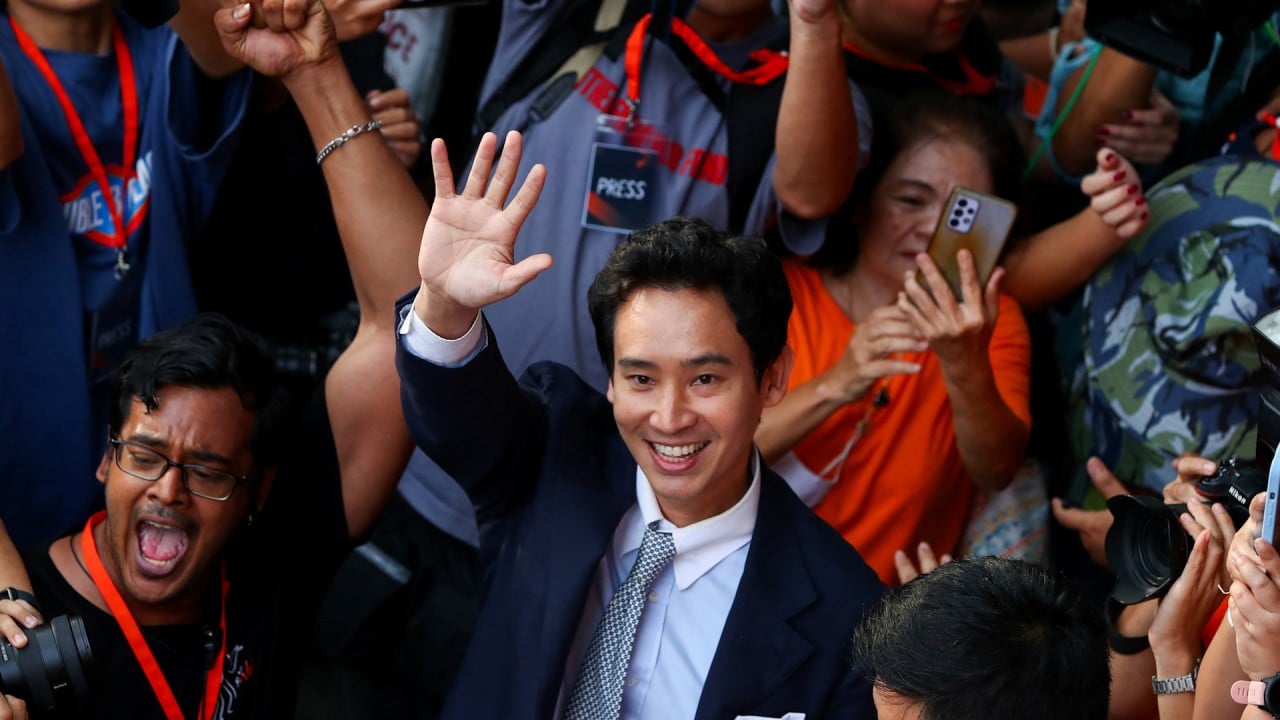Proud father to Thailand’s youngest-ever prime minister, a billionaire returned from the wilderness to the top of Thai power, and a one-time electoral star writing a sequel to one of Southeast Asia’s most remarkable modern political sagas – at the ripe old age of 75, Thaksin Shinawatra is back.
He’s been pardoned from the convictions that drove him into 15 years of self-exile, with a third person bearing his surname – his daughter Paetongtarn – in the prime minister’s office. But experts warn that this return to power comes with an asterisk.
Though Thaksin’s Pheu Thai party has formed a coalition government, it failed to win the most votes in the last Thai election, instead being bumped into second place by the upstart, pro-democracy Move Forward Party – recently dissolved by the courts despite amassing 14 million votes.
That shocking electoral loss forced the Shinawatra clan to change its political clothes, with Pheu Thai now seen by critics as the underwriter of arch-royalist conservative elite interests – a far cry from its past as a pro-democracy outsider championing wealth-redistribution policies to the rural poor.
From 2001-2011, it earned three straight landslide election wins on the back of those policies. But now Pheu Thai leads a coalition of former enemies.

“Thaksin has shown this year that he is no political idealist but instead a political opportunist,” Paul Chambers, a politics expert and lecturer at Thailand’s Naresuan University, told This Week in Asia.
At 38, his daughter has broken records as the youngest person to hold top office in Thailand. But Paetongtarn faces a tough task proving to the Thai public that she carries the interests of more than just her family into office, and that she can control the kingdom’s warring elites.
Her first challenge comes from inside Thailand’s bear-pit politics – having come to power after the sudden removal of Srettha Thavisin by a court in an ethics probe.
That legal move to undermine the Pheu Thai coalition was widely believed to have been orchestrated by General Prawit Wongsuwon, a conservative heavyweight who wields significant back-room power.
But Prawit himself is now under fire. Thailand’s parliament said on Thursday it would investigate Prawit after he was seen in a video hitting ThaiPBS journalist Duangthip Yiamphop several times around the head as he left a building, demanding “What are you asking? What? What?”
The 79-year-old could potentially face suspension as an MP or even a lifetime ban if he is found guilty of a serious ethical violation. He has apologised to Duangthip, saying he “did not have any bad intention”.

Experts say Prawit’s inclusion, or not, in a Paetongtarn government could lead to other ramifications.
After all, the administrations of both her father and aunt, Yingluck, were toppled by coups – with both Shinawatras driven overseas as legal charges rained down upon them.
Thaksin on Thursday marked a year since his return to Thailand and is currently a free man, following a royal pardon. But a legal threat still hangs over him in the form of a charge of violating Section 112 of the Criminal Code, also known as the lèse-majesté law, linked to a decade-old interview he gave to South Korean media.
Analysts say this charge could be activated if old foes feel he is overreaching, while his daughter is now fronting a government whose policy outcomes may later be weaponised against her through the interventionist courts.
“If Thaksin suddenly grasps for power through Ung Ing, expect an early end for this government,” Chambers said, using Paetongtarn’s popular nickname.
“Thaksin could still wind up in jail for violating 112. Ung Ing might also face court cases if she is adjudged [like Srettha] of acting unethically.”

Paetongtarn, with a degree in hotel management from Surrey University, is also a political novice. She has never won an election or held a ministerial post.
She was put forth as one of Pheu Thai’s candidates for prime minister before the May 2023 election and evolved into an energetic campaigner and stump speaker, relentlessly touring the country – while pregnant – alongside Srettha.
The Move Forward Party won that vote, promising economics and structural reforms. But the party was pushed into opposition as Pheu Thai teamed up with the defeated conservative parties to form a coalition.
The Constitutional Court dissolved Move Forward earlier this month and its leading light Pita Limjaroenrat was banned from politics for a decade, alongside other key executives, after calling for reform of the royal defamation law while on the campaign trail.
Such court decisions “are pushing the country towards an eventual reckoning”, according to Matthew Wheeler, a senior analyst for Southeast Asia at the International Crisis Group.
“For many Move Forward supporters, the Constitutional Court’s serial disenfranchisement of voters calls into question the rationale for general elections. The gap between what voters want and what the establishment will tolerate is likely to widen.”
Move Forward has reorganised, now calling itself the People’s Party, and is setting its sights on the 2027 election.
Pheu Thai hopes that the youthful appeal of Paetongtarn will be its trump card by the time the next polls roll around.
She says she will be her own prime minister, working for all Thais with her “own goals”. But she is widely expected to lean on her father and his party’s old figureheads for policy direction.
Thaksin himself has done little so far to quell speculation that he will be prominent in shaping his daughter’s thinking.
When asked this month by reporters if he would dominate her decision-making, he quipped: “Dominate? No, I own her. She’s my daughter.”
Paetongtarn also inherits an underperforming Southeast Asian economy, which is weighed down by massive household debt, at around 90 per cent of gross domestic product, and whose banks are saddled with bad loans.
Thailand’s once thriving manufacturing sector is also struggling to compete, while the country fails to churn out enough graduates to staff the new tech industries that it sorely needs to rise up the value chain.

To the Shinawatra’s loyal supporters, however, having one of the clan back in high office harks back to better economic times.
Thaksin, who came to power in 2001, nursed the Thai economy back to life after the devastating “tom yum goong” financial crisis of the late 1990s. His policies, dubbed “Thaksinomics”, helped spur Japanese investment in key industries like electronics and cars, driving growth rates of over 5 per cent during his first term.
Crucially, Thaksin’s agenda also recognised the changing aspirations of Thailand’s long-neglected rural poor for the first time in the country’s history. Small business loans cascaded down to village-level enterprises, alongside college scholarships for the disadvantaged, farming subsidies, a minimum daily wage of 300 baht, and the introduction of a virtually free “30 baht” universal healthcare scheme.
While that pioneering initiative still struggles for adequate funding two decades later, it continues to provide a vital medical safety net for millions of Thais who have been left behind by the country’s uneven economic development.
However, Thaksin’s populist, pro-poor policies – along with his burgeoning political power and allegations of corruption – soon ruffled the feathers of Bangkok’s establishment elite. This backlash culminated in his overthrow in a 2006 military coup, after which he fled overseas to avoid jail time for corruption charges. Years of bitter, bloody street protests between rival factions then consumed the country.
His younger sister Yingluck would later win a landslide election victory in 2011, only to see her own administration toppled by army chief Prayuth Chan-ocha in another coup in 2014. Prayuth then ran the country for a full decade, leaving behind an anaemic, debt-saddled economy before finally departing office last year after voters hammered his conservative political bloc at the polls.

Another lost decade?
Before his own abrupt removal from power, the former property tycoon Srettha had seen a potential route back to economic growth by aggressively pitching Thailand as a hub for global investment in sectors like casinos, tech, aviation and even an audacious “landbridge” project across the country’s southern neck to slash container shipping times between China and the Indian Ocean.
But those ambitious plans have all now been put on ice under the new government. Meanwhile, Pheu Thai’s campaign promise to further raise the minimum wage has fallen silent, and it is still unclear when a long-delayed 10,000 baht (US$290) digital cash handout scheme will begin.
Crucially, for the young voters who are clamouring for systemic change to Thailand’s entrenched power and wealth inequalities, neither these modest handouts nor the continued prominence of the Shinawatra political brand seem to ignite the same fervent support they once did among their parents’ generation.
After two coups, countless deaths in political violence, court rulings and 20 years lost to instability – all just to see a Shinawatra returned to power yet again – many pro-democracy leaders now warn that Thailand appears to be booking in for some bleak times ahead.
As Pita, the leader of Move Forward who should have become prime minister, tersely told Reuters: “It’s back to square one and nothing has been achieved for the people.”
Still, Paetongtarn and her father are hoping that three years in government before the next scheduled elections in 2027 will be enough time to demonstrate that the Shinawatra political touch remains as potent and magical as ever.
But it will not be an easy task, as captured by the sceptical sentiment of one Move Forward voter.
“Well done to them [the Shinawatras],” said Earn, 30. “My parents might be pleased. But my generation already knows that they are working for their family and not for us.”
Additional reporting by Agence France-Presse



